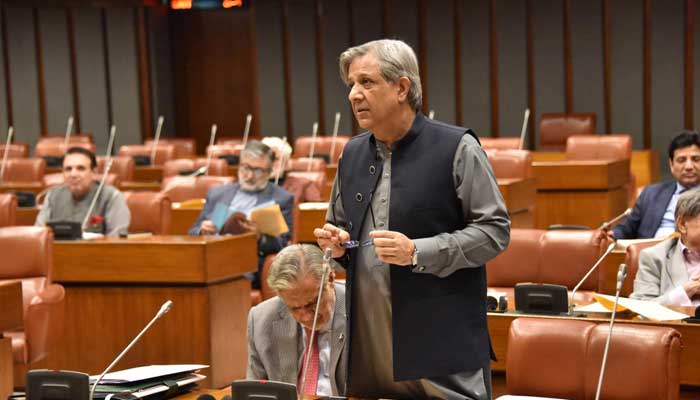Bill raising number of SC judges up to 34 gets parliament's nod
Bill to allow judicial commission to increase number of top court judges up to 34
ISLAMABAD: Shortly after the National Assembly’s approval, the Senate on Monday approved judiciary-centric bills, one of which sought an increase in the number of Supreme Court judges up to 34, amid the opposition’s outcry.
The both houses passed the bills — the Supreme Court Number of Judges (Amendment) Bill, 2024, the Supreme Court Practice and Procedure (Amendment) Bill, 2024, and Islamabad High Court (Amendment) bill, 2024 — tabled by Law Minister Azam Nazeer Tarar.
The first bill sought to increase the number of judges in the Supreme Court up to 34 in a bid to clear the backlog of cases.
According to the statement of objects and reasons, “the number of Judges in the Supreme Court of Pakistan Court is to be fixed under the Supreme Court (Number of Judges) Act, 1997 [...] The number of Judges of the Supreme Court is sixteen plus one Chief Justice. In view of the consistent increase in the litigation in Pakistan and budging pendency, it is necessary that number of Judges in the Supreme Court shall be increased.”
“In light of the above, it is proposed to increase the number of judges in the Supreme Court from sixteen to thirty-three, in addition to the Chief Justice,” it added.
Highlighting the salient features of the bill, the law minister — while speaking on the floor of the lower house — said under the amendment bill, the number of judges may be increased up to 34.
He explained that this move was aimed at tackling the backlog of cases at the apex court and emphasised that the number of judges can be adjusted over time-based requirements.
“This amendment will increase the number of judges in the Supreme Court up to 34, so that the backlog of cases can be cleared, and that after the 26th Amendment, we can have judges to form the constitutional benches.”
In addition to this, the minister presented a bill seeking to amend the SC (Practice and Procedure) Act 2023, aiming to include additions made in the 26th Constitutional Amendment, including the introduction of constitutional benches.
The bill sought to add Article 191A of the Constitution — the creation of constitutional benches — to the preamble.
“Articles 191 and 191A of the Constitution of the Islamic Republic of Pakistan enables the Majlis-e-shoora (Parliament) to provide for the practice and procedure of the Supreme Court including, Constitutional Benches", reads the bill.
Furthermore, the bill proposed another amendment to ensure that the act came into force at the same time as the 26th Constitutional Amendment Act, 2024.
Moreover, another bill — Islamabad High Court (Amendment) Bill, 2024 — seeking an increase in number of judges from nine to 12 in IHC was also passed.
“In view of the consistent increase in the litigation in Islamabad and as it is growing into a cultural and business hub and also it is evident from the growth of population in Islamabad that further litigation will burden the High Court, so it is imperative that number of judges in the Islamabad High Court may be increased,” stated.
Soon after the law minister presented the bill, voting was carried out despite the fierce opposition.
The development came as the ruling coalition continued to bring reforms in the country’s judicial structure with the latest being the 26th Constitutional Amendment — which changed the procedure for the appointment of the CJP, fixed the post's tenure, and formed constitutional benches.
PTI lambasts govt for turning parliament into 'rubber-stamp'
Speaking to journalists outside the parliament, the Pakistan Tehreek-e-Insaf (PTI) categorically rejected the fresh bills bulldozed through the parliament, with its chairman Barrister Gohar Ali Khan accusing the government of turning parliament into a “rubber-stamp”.
“Pakistan’s parliament is being made rubber-stamp. [Opposition’s] voice in the House is being silenced. This monarchy cannot be the fate of the Pakistani nation,” he said.
The PTI leader said that the people of Pakistan reject any kind of legislation that leads the country to a monarchy.
Referring to the pace of approval by the parliament, Barrister Gohar said that he was sure that the lawmakers who gave their nod to the legislation today did not even know the content of the bills.
Slamming the SC-centric bill, the PTI leader said: “A state has three pillars, if you weak one pillar, you are weakening the whole state.”
He was of the view that the government was usurping the basic rights of the people and pushing the country towards destruction.
-
Security forces gun down 30 terrorists in multiple IBOs in KP: ISPR
-
MQM-P calls for new province in Sindh
-
US report validates Pakistan military edge over India: PM
-
Banned TTP poses serious threat to Pakistan security: UNSC panel
-
CM Afridi clarifies remarks on by-poll after ECP requests army deployment
-
Dubai sees 3.2m Pakistani passengers in 2025 as airport sets new milestone
-
Security forces kill 23 Indian proxy terrorists in KP's Kurram
-
Pakistan to construct island to boost oil exploration: report












